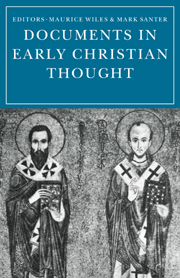10 - CHURCH AND SOCIETY
Published online by Cambridge University Press: 17 August 2009
Summary
Until the conversion of Constantine Christian attitudes to secular authority ran along lines inherited from Judaism. Secular authority was ordained by God for the government of the world; kings and rulers were to be respected and prayed for. At the same time no respect could be paid or prayer addressed to the gods of pagan society.
The first three passages of this section come from this early period and make these points. Irenaeus makes the general point that secular authority falls under the providence of the one God. The passages from Tertullian and Origen clearly reflect the hostility that Christians experienced in society. Tertullian writes against a background of actual persecution and Origen seeks to answer the charge of the pagan Celsus that Christians were guilty of an irresponsible abdication of their responsibilities to society.
Eusebius, in an oration delivered in Constantine's own presence in 335, writes in the new situation that followed the emperor's conversion. He draws on the language of Hellenistic writers on monarchy to produce a picture of the emperor that goes far beyond the traditional Christian respect for his office: Constantine is God's viceregent on earth. It is a picture of monarchy that leaves little room for any polarity of Church and state.
The last two passages come from Augustine, writing some eighty years later. The first is part of a public letter to a military commander, Boniface, justifying the suppression of Donatism.
- Type
- Chapter
- Information
- Documents in Early Christian Thought , pp. 224 - 244Publisher: Cambridge University PressPrint publication year: 1975



